Geriatrician Resume Examples

Jul 18, 2024
|
12 min read
Craft your geriatrician resume: seasoned tips to showcase your experience and skills in elder care, ensuring you stand out in a growing field where your expertise is golden.
Rated by 348 people
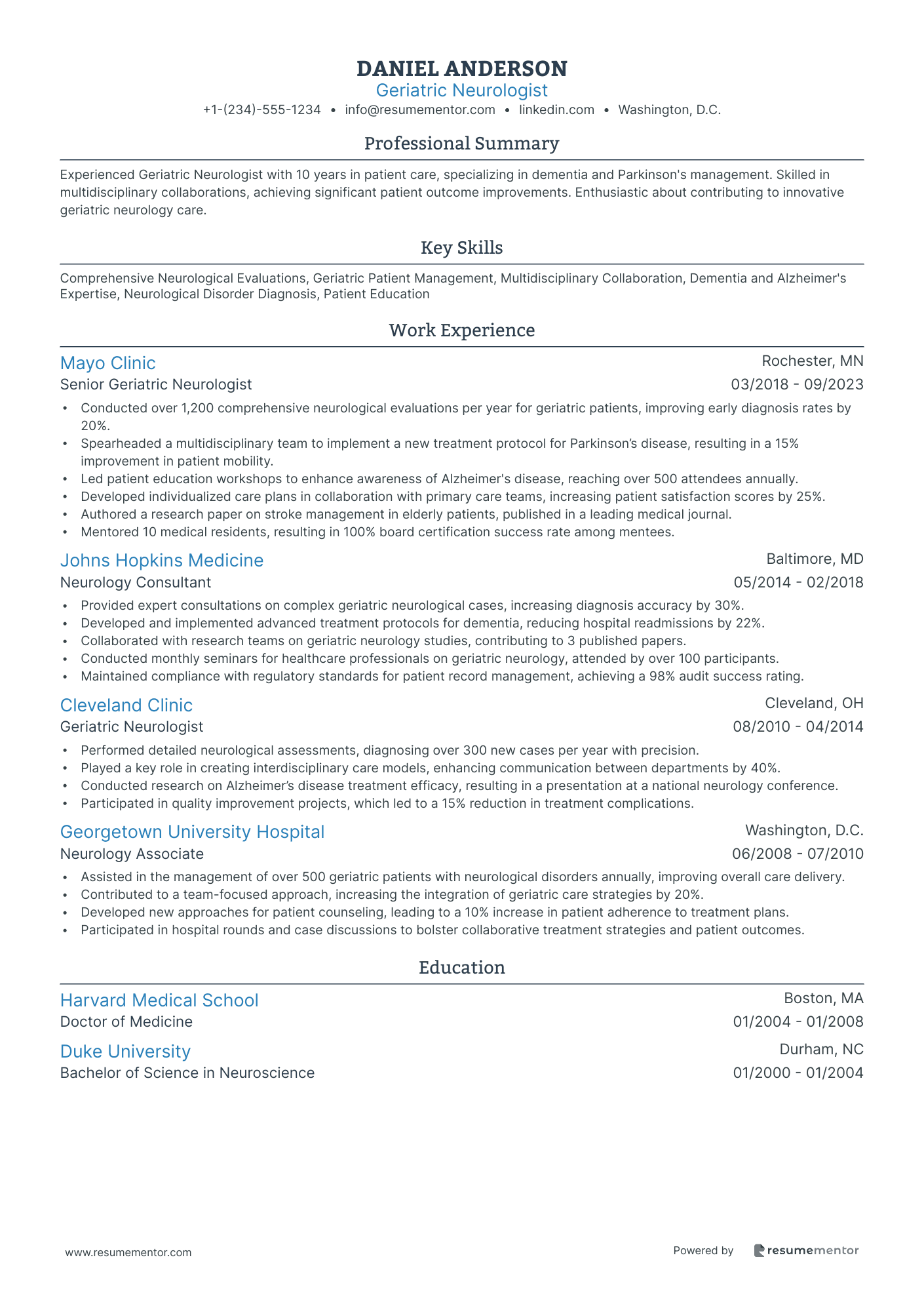
Geriatric Neurologist
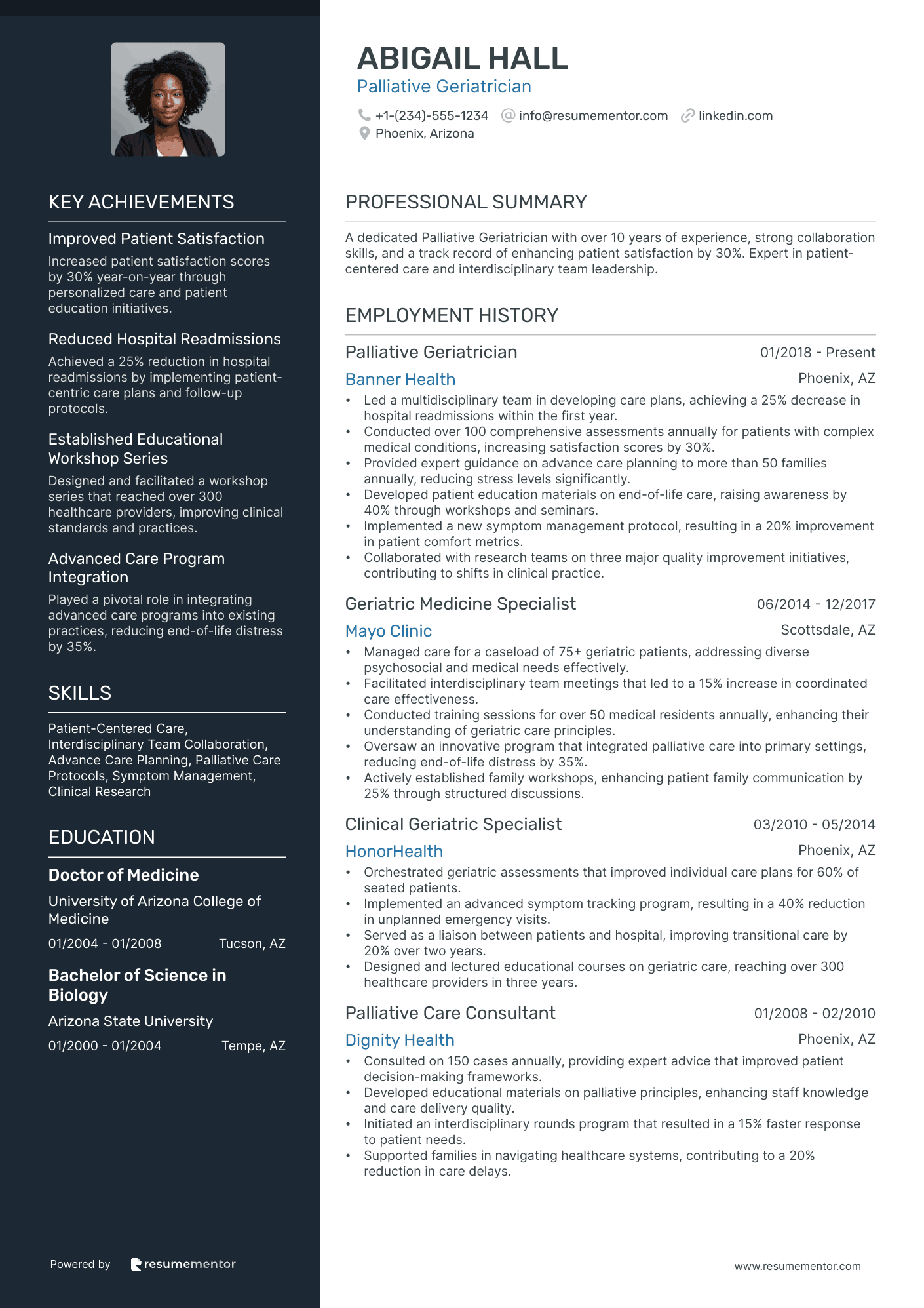
Palliative Geriatrician
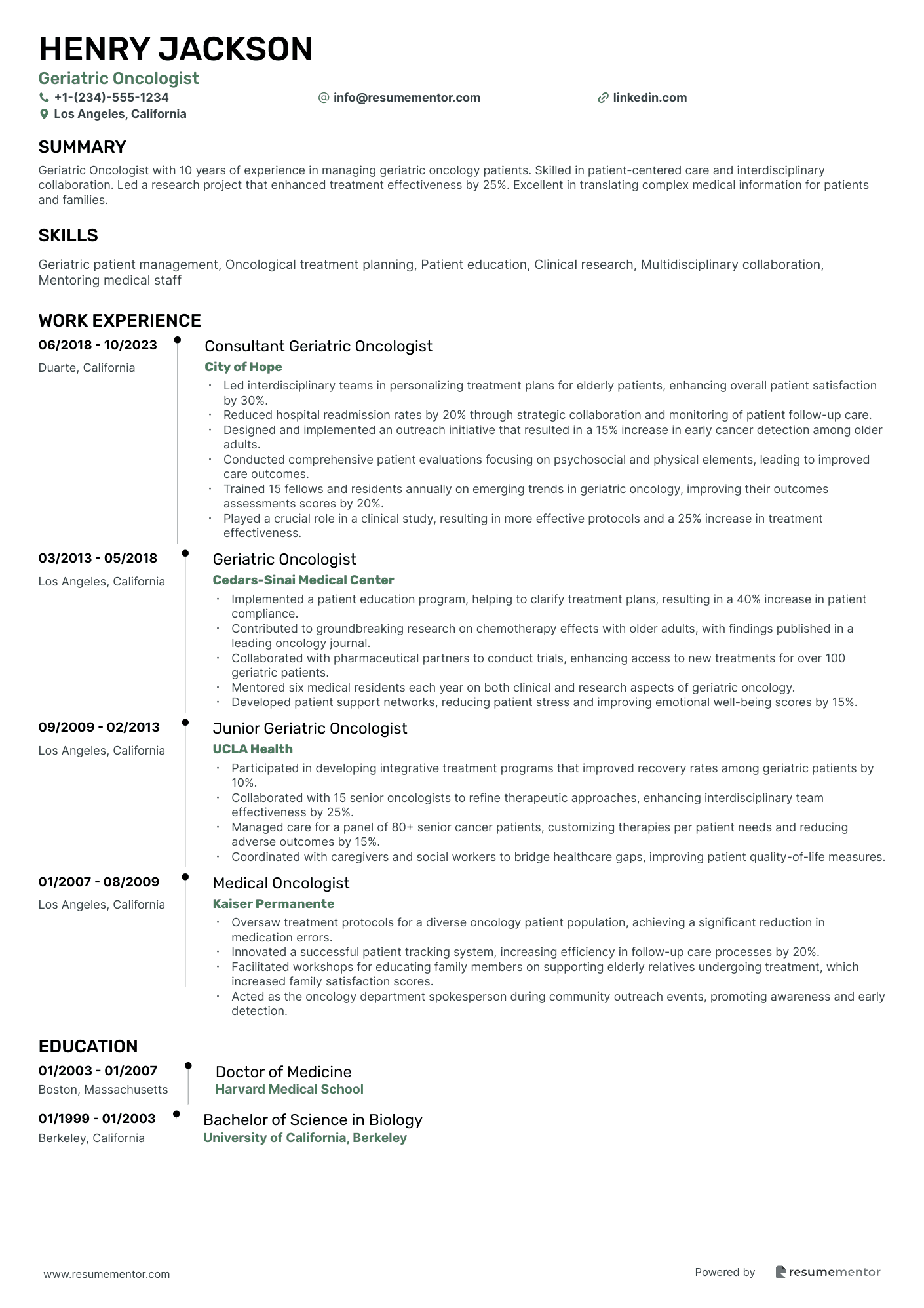
Geriatric Oncologist
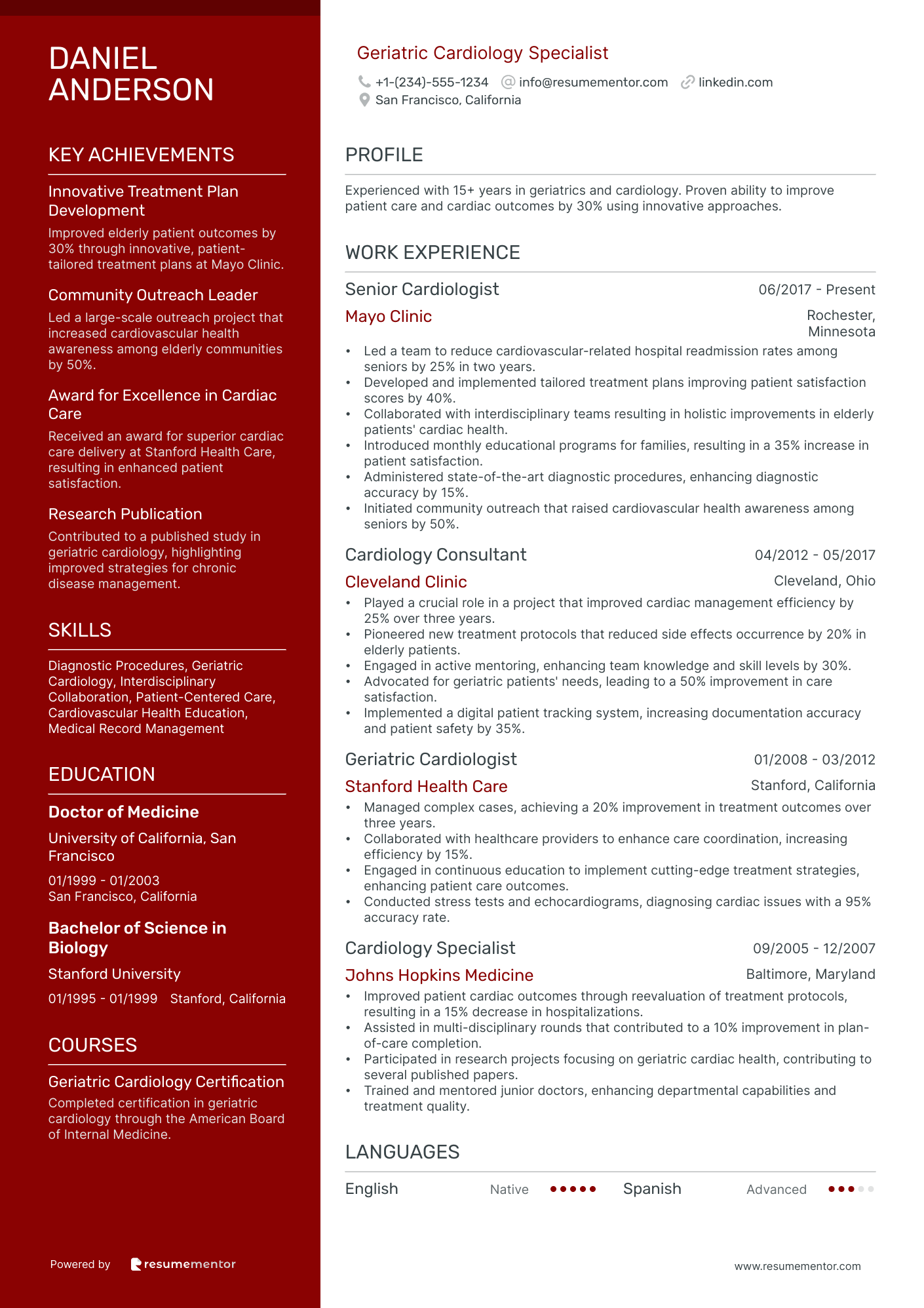
Geriatric Cardiology Specialist
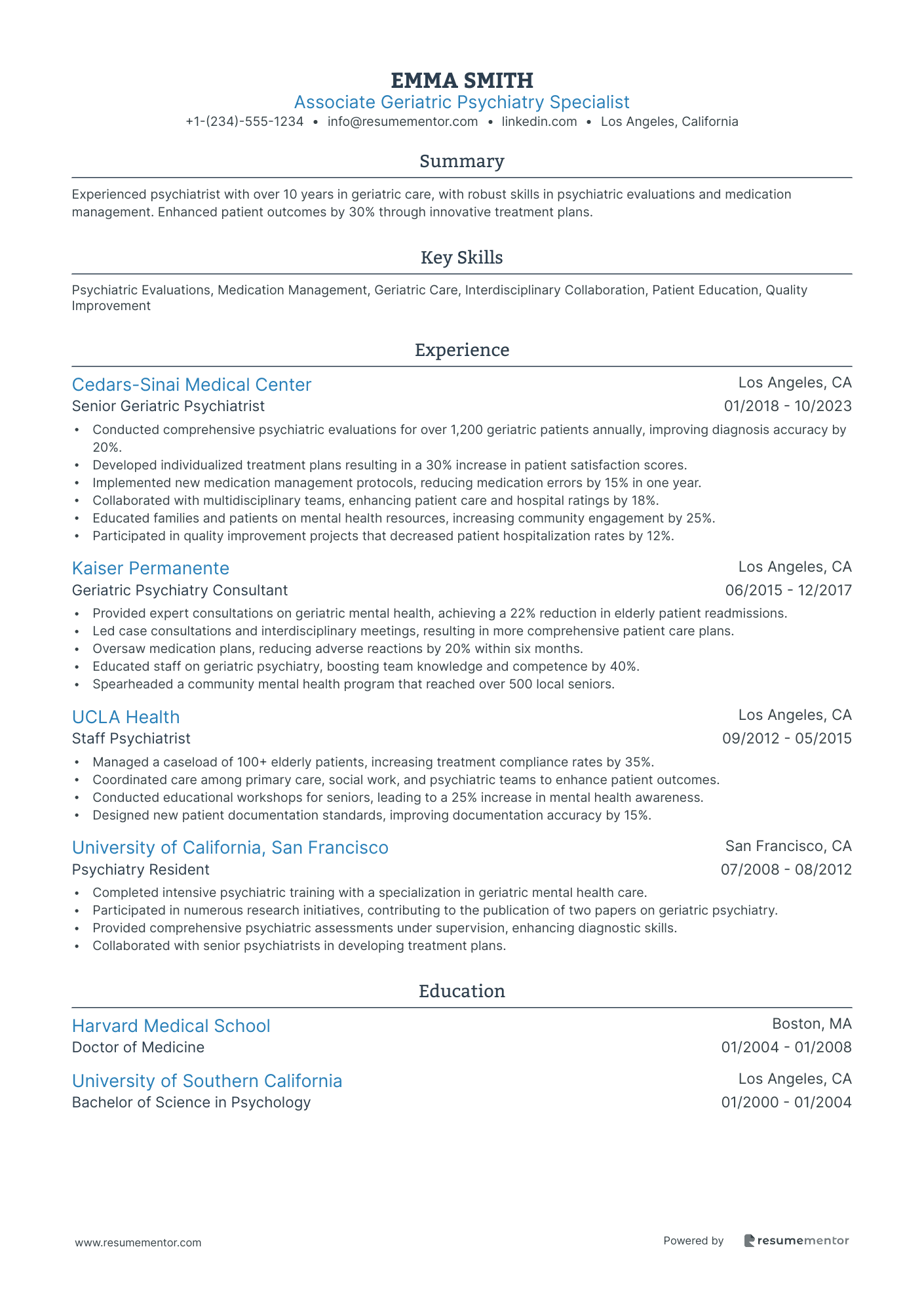
Associate Geriatric Psychiatry Specialist
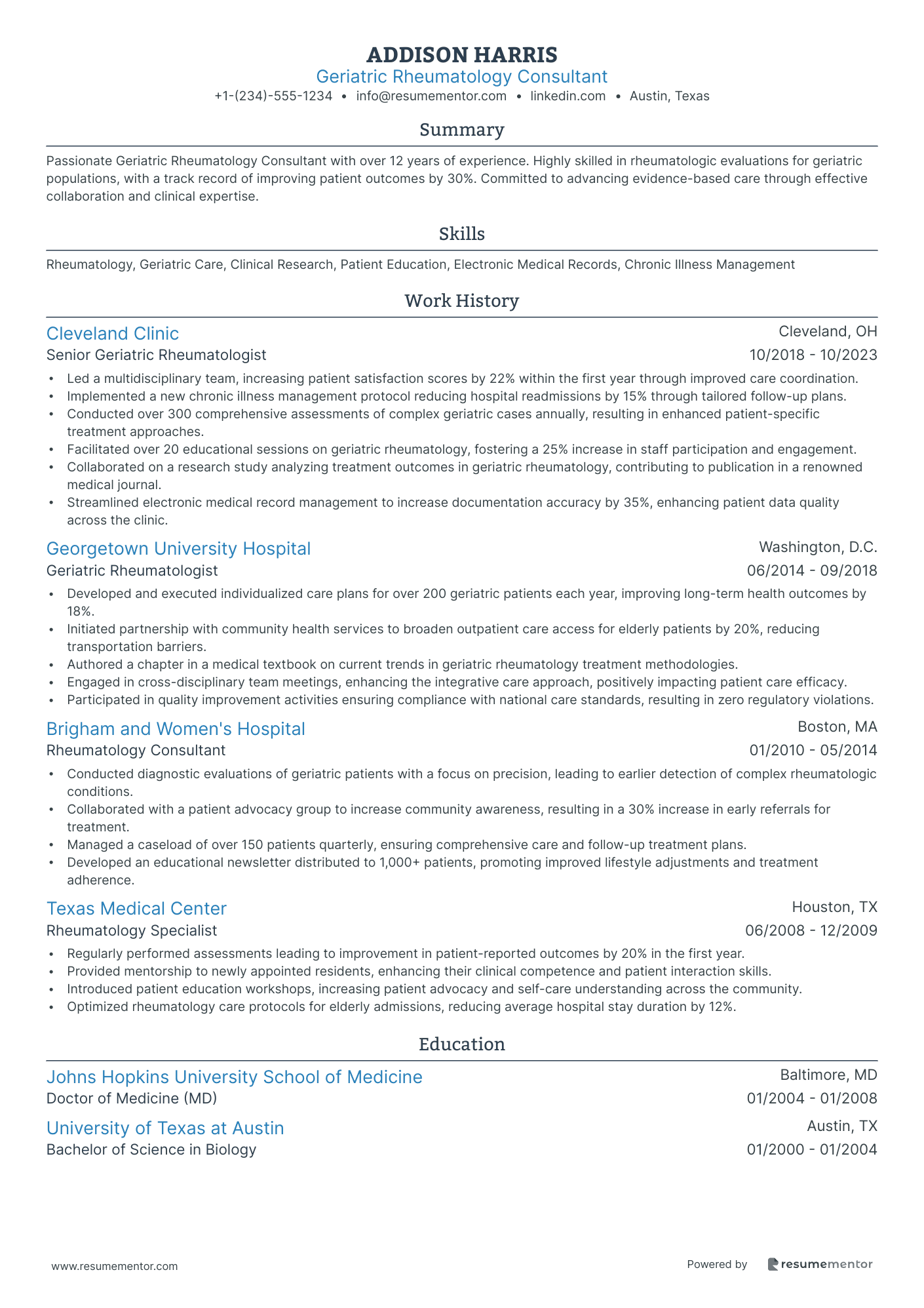
Geriatric Rheumatology Consultant
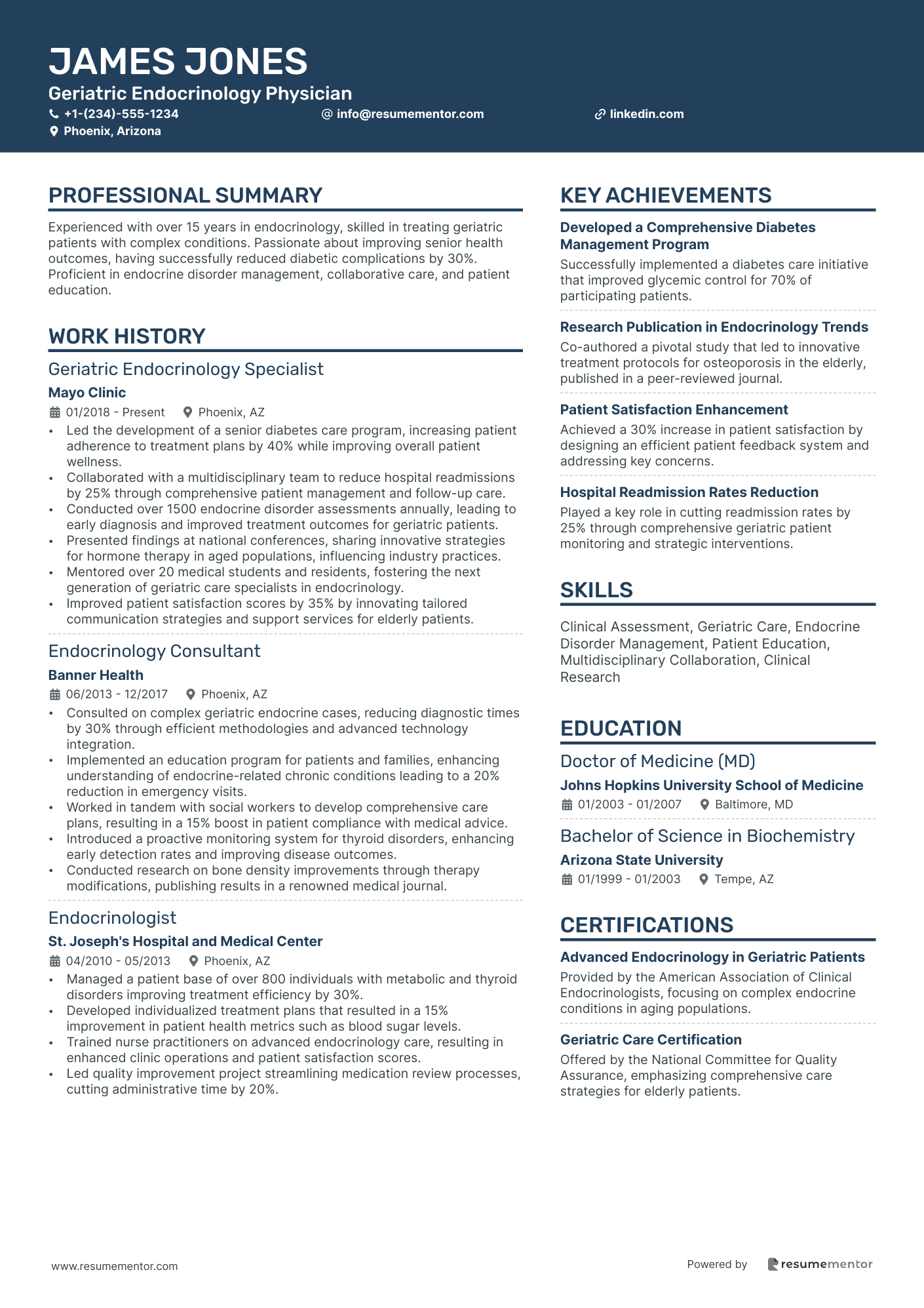
Geriatric Endocrinology Physician
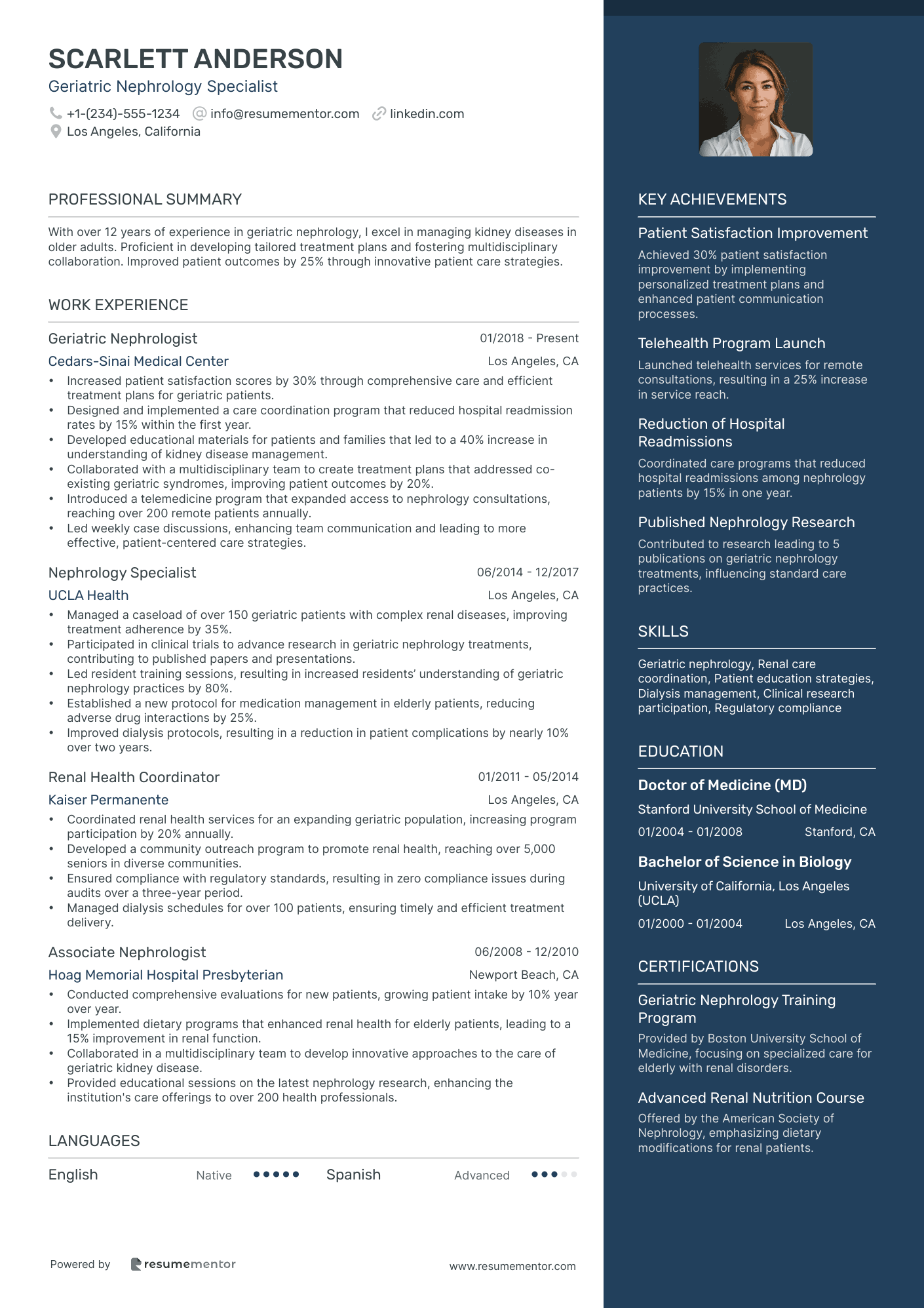
Geriatric Nephrology Specialist
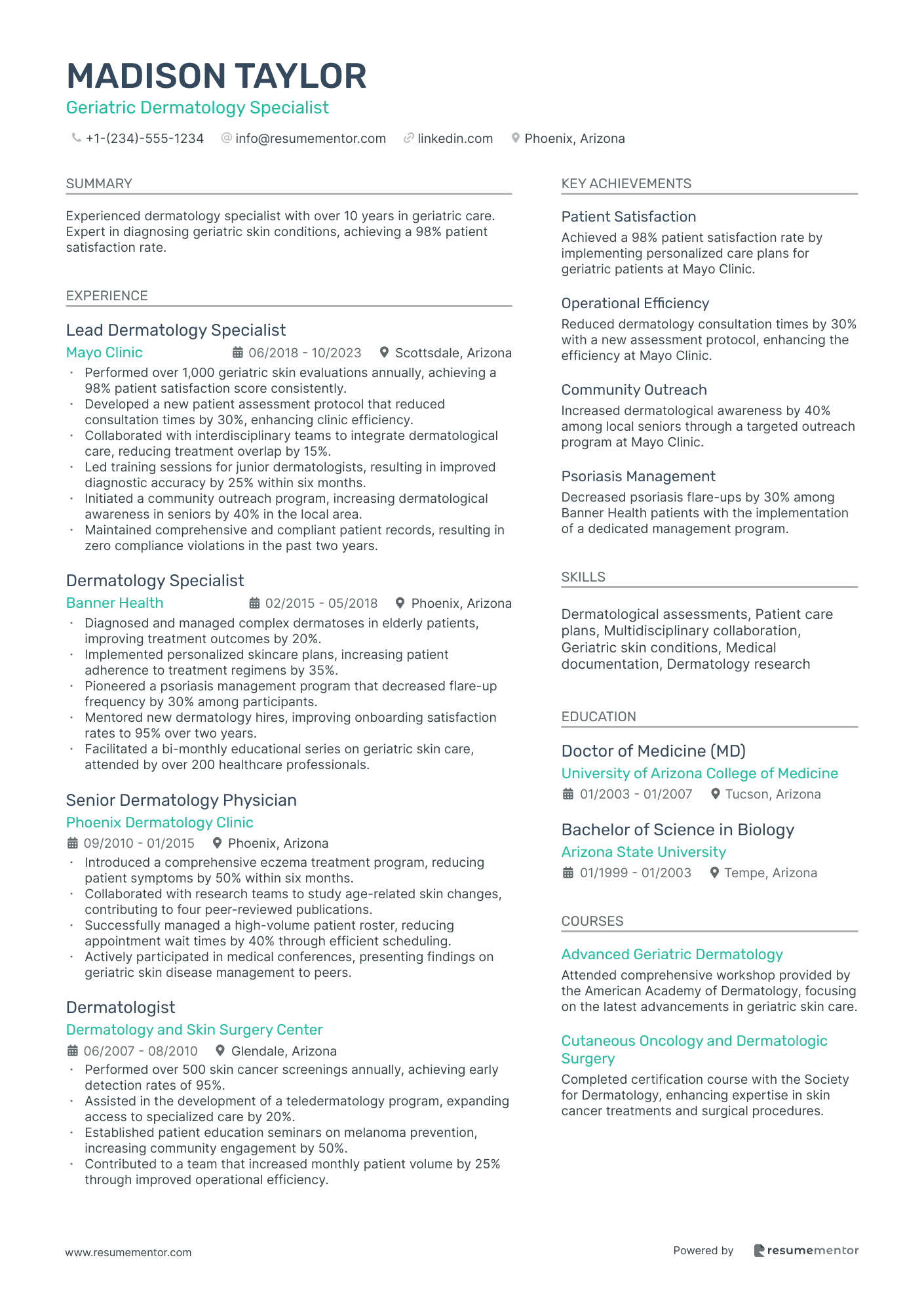
Geriatric Dermatology Specialist
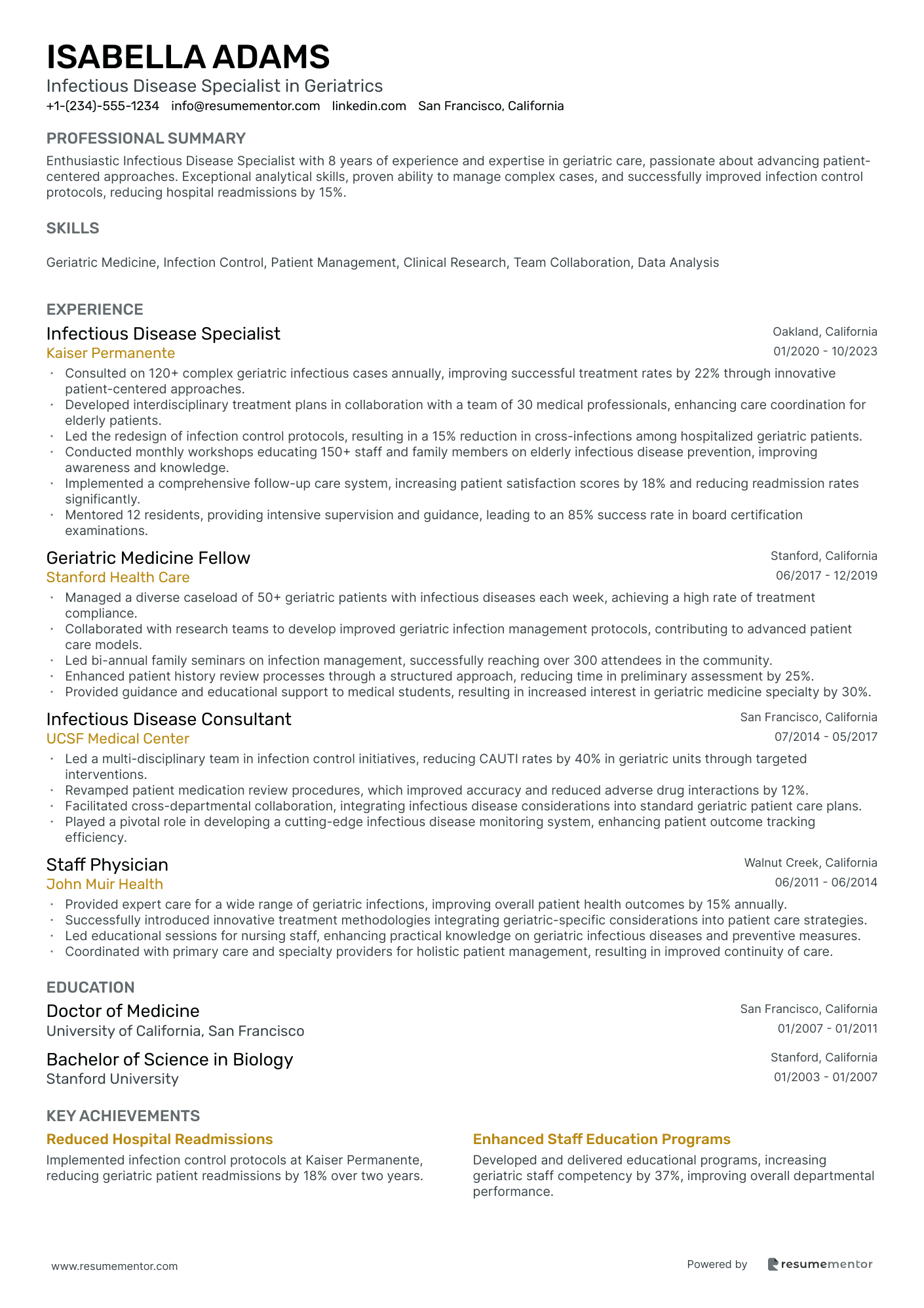
Infectious Disease Specialist in Geriatrics

Geriatric Neurologist resume sample
- •Conducted over 1,200 comprehensive neurological evaluations per year for geriatric patients, improving early diagnosis rates by 20%.
- •Spearheaded a multidisciplinary team to implement a new treatment protocol for Parkinson’s disease, resulting in a 15% improvement in patient mobility.
- •Led patient education workshops to enhance awareness of Alzheimer's disease, reaching over 500 attendees annually.
- •Developed individualized care plans in collaboration with primary care teams, increasing patient satisfaction scores by 25%.
- •Authored a research paper on stroke management in elderly patients, published in a leading medical journal.
- •Mentored 10 medical residents, resulting in 100% board certification success rate among mentees.
- •Provided expert consultations on complex geriatric neurological cases, increasing diagnosis accuracy by 30%.
- •Developed and implemented advanced treatment protocols for dementia, reducing hospital readmissions by 22%.
- •Collaborated with research teams on geriatric neurology studies, contributing to 3 published papers.
- •Conducted monthly seminars for healthcare professionals on geriatric neurology, attended by over 100 participants.
- •Maintained compliance with regulatory standards for patient record management, achieving a 98% audit success rating.
- •Performed detailed neurological assessments, diagnosing over 300 new cases per year with precision.
- •Played a key role in creating interdisciplinary care models, enhancing communication between departments by 40%.
- •Conducted research on Alzheimer’s disease treatment efficacy, resulting in a presentation at a national neurology conference.
- •Participated in quality improvement projects, which led to a 15% reduction in treatment complications.
- •Assisted in the management of over 500 geriatric patients with neurological disorders annually, improving overall care delivery.
- •Contributed to a team-focused approach, increasing the integration of geriatric care strategies by 20%.
- •Developed new approaches for patient counseling, leading to a 10% increase in patient adherence to treatment plans.
- •Participated in hospital rounds and case discussions to bolster collaborative treatment strategies and patient outcomes.
Palliative Geriatrician resume sample
- •Led a multidisciplinary team in developing care plans, achieving a 25% decrease in hospital readmissions within the first year.
- •Conducted over 100 comprehensive assessments annually for patients with complex medical conditions, increasing satisfaction scores by 30%.
- •Provided expert guidance on advance care planning to more than 50 families annually, reducing stress levels significantly.
- •Developed patient education materials on end-of-life care, raising awareness by 40% through workshops and seminars.
- •Implemented a new symptom management protocol, resulting in a 20% improvement in patient comfort metrics.
- •Collaborated with research teams on three major quality improvement initiatives, contributing to shifts in clinical practice.
- •Managed care for a caseload of 75+ geriatric patients, addressing diverse psychosocial and medical needs effectively.
- •Facilitated interdisciplinary team meetings that led to a 15% increase in coordinated care effectiveness.
- •Conducted training sessions for over 50 medical residents annually, enhancing their understanding of geriatric care principles.
- •Oversaw an innovative program that integrated palliative care into primary settings, reducing end-of-life distress by 35%.
- •Actively established family workshops, enhancing patient family communication by 25% through structured discussions.
- •Orchestrated geriatric assessments that improved individual care plans for 60% of seated patients.
- •Implemented an advanced symptom tracking program, resulting in a 40% reduction in unplanned emergency visits.
- •Served as a liaison between patients and hospital, improving transitional care by 20% over two years.
- •Designed and lectured educational courses on geriatric care, reaching over 300 healthcare providers in three years.
- •Consulted on 150 cases annually, providing expert advice that improved patient decision-making frameworks.
- •Developed educational materials on palliative principles, enhancing staff knowledge and care delivery quality.
- •Initiated an interdisciplinary rounds program that resulted in a 15% faster response to patient needs.
- •Supported families in navigating healthcare systems, contributing to a 20% reduction in care delays.
Geriatric Oncologist resume sample
- •Led interdisciplinary teams in personalizing treatment plans for elderly patients, enhancing overall patient satisfaction by 30%.
- •Reduced hospital readmission rates by 20% through strategic collaboration and monitoring of patient follow-up care.
- •Designed and implemented an outreach initiative that resulted in a 15% increase in early cancer detection among older adults.
- •Conducted comprehensive patient evaluations focusing on psychosocial and physical elements, leading to improved care outcomes.
- •Trained 15 fellows and residents annually on emerging trends in geriatric oncology, improving their outcomes assessments scores by 20%.
- •Played a crucial role in a clinical study, resulting in more effective protocols and a 25% increase in treatment effectiveness.
- •Implemented a patient education program, helping to clarify treatment plans, resulting in a 40% increase in patient compliance.
- •Contributed to groundbreaking research on chemotherapy effects with older adults, with findings published in a leading oncology journal.
- •Collaborated with pharmaceutical partners to conduct trials, enhancing access to new treatments for over 100 geriatric patients.
- •Mentored six medical residents each year on both clinical and research aspects of geriatric oncology.
- •Developed patient support networks, reducing patient stress and improving emotional well-being scores by 15%.
- •Participated in developing integrative treatment programs that improved recovery rates among geriatric patients by 10%.
- •Collaborated with 15 senior oncologists to refine therapeutic approaches, enhancing interdisciplinary team effectiveness by 25%.
- •Managed care for a panel of 80+ senior cancer patients, customizing therapies per patient needs and reducing adverse outcomes by 15%.
- •Coordinated with caregivers and social workers to bridge healthcare gaps, improving patient quality-of-life measures.
- •Oversaw treatment protocols for a diverse oncology patient population, achieving a significant reduction in medication errors.
- •Innovated a successful patient tracking system, increasing efficiency in follow-up care processes by 20%.
- •Facilitated workshops for educating family members on supporting elderly relatives undergoing treatment, which increased family satisfaction scores.
- •Acted as the oncology department spokesperson during community outreach events, promoting awareness and early detection.
Geriatric Cardiology Specialist resume sample
- •Led a team to reduce cardiovascular-related hospital readmission rates among seniors by 25% in two years.
- •Developed and implemented tailored treatment plans improving patient satisfaction scores by 40%.
- •Collaborated with interdisciplinary teams resulting in holistic improvements in elderly patients' cardiac health.
- •Introduced monthly educational programs for families, resulting in a 35% increase in patient satisfaction.
- •Administered state-of-the-art diagnostic procedures, enhancing diagnostic accuracy by 15%.
- •Initiated community outreach that raised cardiovascular health awareness among seniors by 50%.
- •Played a crucial role in a project that improved cardiac management efficiency by 25% over three years.
- •Pioneered new treatment protocols that reduced side effects occurrence by 20% in elderly patients.
- •Engaged in active mentoring, enhancing team knowledge and skill levels by 30%.
- •Advocated for geriatric patients' needs, leading to a 50% improvement in care satisfaction.
- •Implemented a digital patient tracking system, increasing documentation accuracy and patient safety by 35%.
- •Managed complex cases, achieving a 20% improvement in treatment outcomes over three years.
- •Collaborated with healthcare providers to enhance care coordination, increasing efficiency by 15%.
- •Engaged in continuous education to implement cutting-edge treatment strategies, enhancing patient care outcomes.
- •Conducted stress tests and echocardiograms, diagnosing cardiac issues with a 95% accuracy rate.
- •Improved patient cardiac outcomes through reevaluation of treatment protocols, resulting in a 15% decrease in hospitalizations.
- •Assisted in multi-disciplinary rounds that contributed to a 10% improvement in plan-of-care completion.
- •Participated in research projects focusing on geriatric cardiac health, contributing to several published papers.
- •Trained and mentored junior doctors, enhancing departmental capabilities and treatment quality.
Associate Geriatric Psychiatry Specialist resume sample
- •Conducted comprehensive psychiatric evaluations for over 1,200 geriatric patients annually, improving diagnosis accuracy by 20%.
- •Developed individualized treatment plans resulting in a 30% increase in patient satisfaction scores.
- •Implemented new medication management protocols, reducing medication errors by 15% in one year.
- •Collaborated with multidisciplinary teams, enhancing patient care and hospital ratings by 18%.
- •Educated families and patients on mental health resources, increasing community engagement by 25%.
- •Participated in quality improvement projects that decreased patient hospitalization rates by 12%.
- •Provided expert consultations on geriatric mental health, achieving a 22% reduction in elderly patient readmissions.
- •Led case consultations and interdisciplinary meetings, resulting in more comprehensive patient care plans.
- •Oversaw medication plans, reducing adverse reactions by 20% within six months.
- •Educated staff on geriatric psychiatry, boosting team knowledge and competence by 40%.
- •Spearheaded a community mental health program that reached over 500 local seniors.
- •Managed a caseload of 100+ elderly patients, increasing treatment compliance rates by 35%.
- •Coordinated care among primary care, social work, and psychiatric teams to enhance patient outcomes.
- •Conducted educational workshops for seniors, leading to a 25% increase in mental health awareness.
- •Designed new patient documentation standards, improving documentation accuracy by 15%.
- •Completed intensive psychiatric training with a specialization in geriatric mental health care.
- •Participated in numerous research initiatives, contributing to the publication of two papers on geriatric psychiatry.
- •Provided comprehensive psychiatric assessments under supervision, enhancing diagnostic skills.
- •Collaborated with senior psychiatrists in developing treatment plans.
Geriatric Rheumatology Consultant resume sample
- •Led a multidisciplinary team, increasing patient satisfaction scores by 22% within the first year through improved care coordination.
- •Implemented a new chronic illness management protocol reducing hospital readmissions by 15% through tailored follow-up plans.
- •Conducted over 300 comprehensive assessments of complex geriatric cases annually, resulting in enhanced patient-specific treatment approaches.
- •Facilitated over 20 educational sessions on geriatric rheumatology, fostering a 25% increase in staff participation and engagement.
- •Collaborated on a research study analyzing treatment outcomes in geriatric rheumatology, contributing to publication in a renowned medical journal.
- •Streamlined electronic medical record management to increase documentation accuracy by 35%, enhancing patient data quality across the clinic.
- •Developed and executed individualized care plans for over 200 geriatric patients each year, improving long-term health outcomes by 18%.
- •Initiated partnership with community health services to broaden outpatient care access for elderly patients by 20%, reducing transportation barriers.
- •Authored a chapter in a medical textbook on current trends in geriatric rheumatology treatment methodologies.
- •Engaged in cross-disciplinary team meetings, enhancing the integrative care approach, positively impacting patient care efficacy.
- •Participated in quality improvement activities ensuring compliance with national care standards, resulting in zero regulatory violations.
- •Conducted diagnostic evaluations of geriatric patients with a focus on precision, leading to earlier detection of complex rheumatologic conditions.
- •Collaborated with a patient advocacy group to increase community awareness, resulting in a 30% increase in early referrals for treatment.
- •Managed a caseload of over 150 patients quarterly, ensuring comprehensive care and follow-up treatment plans.
- •Developed an educational newsletter distributed to 1,000+ patients, promoting improved lifestyle adjustments and treatment adherence.
- •Regularly performed assessments leading to improvement in patient-reported outcomes by 20% in the first year.
- •Provided mentorship to newly appointed residents, enhancing their clinical competence and patient interaction skills.
- •Introduced patient education workshops, increasing patient advocacy and self-care understanding across the community.
- •Optimized rheumatology care protocols for elderly admissions, reducing average hospital stay duration by 12%.
Geriatric Endocrinology Physician resume sample
- •Led the development of a senior diabetes care program, increasing patient adherence to treatment plans by 40% while improving overall patient wellness.
- •Collaborated with a multidisciplinary team to reduce hospital readmissions by 25% through comprehensive patient management and follow-up care.
- •Conducted over 1500 endocrine disorder assessments annually, leading to early diagnosis and improved treatment outcomes for geriatric patients.
- •Presented findings at national conferences, sharing innovative strategies for hormone therapy in aged populations, influencing industry practices.
- •Mentored over 20 medical students and residents, fostering the next generation of geriatric care specialists in endocrinology.
- •Improved patient satisfaction scores by 35% by innovating tailored communication strategies and support services for elderly patients.
- •Consulted on complex geriatric endocrine cases, reducing diagnostic times by 30% through efficient methodologies and advanced technology integration.
- •Implemented an education program for patients and families, enhancing understanding of endocrine-related chronic conditions leading to a 20% reduction in emergency visits.
- •Worked in tandem with social workers to develop comprehensive care plans, resulting in a 15% boost in patient compliance with medical advice.
- •Introduced a proactive monitoring system for thyroid disorders, enhancing early detection rates and improving disease outcomes.
- •Conducted research on bone density improvements through therapy modifications, publishing results in a renowned medical journal.
- •Managed a patient base of over 800 individuals with metabolic and thyroid disorders improving treatment efficiency by 30%.
- •Developed individualized treatment plans that resulted in a 15% improvement in patient health metrics such as blood sugar levels.
- •Trained nurse practitioners on advanced endocrinology care, resulting in enhanced clinic operations and patient satisfaction scores.
- •Led quality improvement project streamlining medication review processes, cutting administrative time by 20%.
- •Conducted comprehensive evaluations of patients presenting with hormonal imbalances and successfully developed effective management plans.
- •Participated in groundbreaking research on diabetes medication advancements, contributing to a significant journal publication.
- •Engaged in community outreach programs raising awareness of endocrine disorders, increasing clinic footfall by 10%.
- •Assisted in departmental audits, maintaining compliance with national healthcare standards while improving operational efficiency.
Geriatric Nephrology Specialist resume sample
- •Increased patient satisfaction scores by 30% through comprehensive care and efficient treatment plans for geriatric patients.
- •Designed and implemented a care coordination program that reduced hospital readmission rates by 15% within the first year.
- •Developed educational materials for patients and families that led to a 40% increase in understanding of kidney disease management.
- •Collaborated with a multidisciplinary team to create treatment plans that addressed co-existing geriatric syndromes, improving patient outcomes by 20%.
- •Introduced a telemedicine program that expanded access to nephrology consultations, reaching over 200 remote patients annually.
- •Led weekly case discussions, enhancing team communication and leading to more effective, patient-centered care strategies.
- •Managed a caseload of over 150 geriatric patients with complex renal diseases, improving treatment adherence by 35%.
- •Participated in clinical trials to advance research in geriatric nephrology treatments, contributing to published papers and presentations.
- •Led resident training sessions, resulting in increased residents’ understanding of geriatric nephrology practices by 80%.
- •Established a new protocol for medication management in elderly patients, reducing adverse drug interactions by 25%.
- •Improved dialysis protocols, resulting in a reduction in patient complications by nearly 10% over two years.
- •Coordinated renal health services for an expanding geriatric population, increasing program participation by 20% annually.
- •Developed a community outreach program to promote renal health, reaching over 5,000 seniors in diverse communities.
- •Ensured compliance with regulatory standards, resulting in zero compliance issues during audits over a three-year period.
- •Managed dialysis schedules for over 100 patients, ensuring timely and efficient treatment delivery.
- •Conducted comprehensive evaluations for new patients, growing patient intake by 10% year over year.
- •Implemented dietary programs that enhanced renal health for elderly patients, leading to a 15% improvement in renal function.
- •Collaborated in a multidisciplinary team to develop innovative approaches to the care of geriatric kidney disease.
- •Provided educational sessions on the latest nephrology research, enhancing the institution's care offerings to over 200 health professionals.
Geriatric Dermatology Specialist resume sample
- •Performed over 1,000 geriatric skin evaluations annually, achieving a 98% patient satisfaction score consistently.
- •Developed a new patient assessment protocol that reduced consultation times by 30%, enhancing clinic efficiency.
- •Collaborated with interdisciplinary teams to integrate dermatological care, reducing treatment overlap by 15%.
- •Led training sessions for junior dermatologists, resulting in improved diagnostic accuracy by 25% within six months.
- •Initiated a community outreach program, increasing dermatological awareness in seniors by 40% in the local area.
- •Maintained comprehensive and compliant patient records, resulting in zero compliance violations in the past two years.
- •Diagnosed and managed complex dermatoses in elderly patients, improving treatment outcomes by 20%.
- •Implemented personalized skincare plans, increasing patient adherence to treatment regimens by 35%.
- •Pioneered a psoriasis management program that decreased flare-up frequency by 30% among participants.
- •Mentored new dermatology hires, improving onboarding satisfaction rates to 95% over two years.
- •Facilitated a bi-monthly educational series on geriatric skin care, attended by over 200 healthcare professionals.
- •Introduced a comprehensive eczema treatment program, reducing patient symptoms by 50% within six months.
- •Collaborated with research teams to study age-related skin changes, contributing to four peer-reviewed publications.
- •Successfully managed a high-volume patient roster, reducing appointment wait times by 40% through efficient scheduling.
- •Actively participated in medical conferences, presenting findings on geriatric skin disease management to peers.
- •Performed over 500 skin cancer screenings annually, achieving early detection rates of 95%.
- •Assisted in the development of a teledermatology program, expanding access to specialized care by 20%.
- •Established patient education seminars on melanoma prevention, increasing community engagement by 50%.
- •Contributed to a team that increased monthly patient volume by 25% through improved operational efficiency.
Infectious Disease Specialist in Geriatrics resume sample
- •Consulted on 120+ complex geriatric infectious cases annually, improving successful treatment rates by 22% through innovative patient-centered approaches.
- •Developed interdisciplinary treatment plans in collaboration with a team of 30 medical professionals, enhancing care coordination for elderly patients.
- •Led the redesign of infection control protocols, resulting in a 15% reduction in cross-infections among hospitalized geriatric patients.
- •Conducted monthly workshops educating 150+ staff and family members on elderly infectious disease prevention, improving awareness and knowledge.
- •Implemented a comprehensive follow-up care system, increasing patient satisfaction scores by 18% and reducing readmission rates significantly.
- •Mentored 12 residents, providing intensive supervision and guidance, leading to an 85% success rate in board certification examinations.
- •Managed a diverse caseload of 50+ geriatric patients with infectious diseases each week, achieving a high rate of treatment compliance.
- •Collaborated with research teams to develop improved geriatric infection management protocols, contributing to advanced patient care models.
- •Led bi-annual family seminars on infection management, successfully reaching over 300 attendees in the community.
- •Enhanced patient history review processes through a structured approach, reducing time in preliminary assessment by 25%.
- •Provided guidance and educational support to medical students, resulting in increased interest in geriatric medicine specialty by 30%.
- •Led a multi-disciplinary team in infection control initiatives, reducing CAUTI rates by 40% in geriatric units through targeted interventions.
- •Revamped patient medication review procedures, which improved accuracy and reduced adverse drug interactions by 12%.
- •Facilitated cross-departmental collaboration, integrating infectious disease considerations into standard geriatric patient care plans.
- •Played a pivotal role in developing a cutting-edge infectious disease monitoring system, enhancing patient outcome tracking efficiency.
- •Provided expert care for a wide range of geriatric infections, improving overall patient health outcomes by 15% annually.
- •Successfully introduced innovative treatment methodologies integrating geriatric-specific considerations into patient care strategies.
- •Led educational sessions for nursing staff, enhancing practical knowledge on geriatric infectious diseases and preventive measures.
- •Coordinated with primary care and specialty providers for holistic patient management, resulting in improved continuity of care.
Creating the perfect geriatrician resume is like crafting a masterpiece that reflects your professional journey. Each detail plays a crucial role in showcasing your skills and experiences. As a geriatrician, you face unique challenges in the job market, making it essential to highlight your expertise in elder care while keeping your resume easy to digest.
Specializing in care for the elderly sets you apart, and it’s key to convey this distinct expertise clearly. However, translating years of dedication and medical proficiency into simple, impactful words can be daunting. This is where a strategic approach to organizing your achievements comes in.
Using a resume template can be a game-changer in this process. The right template helps you arrange your information so your strengths are clear and compelling. It ensures your story is coherent and quickly communicates to potential employers why you're the perfect fit.
A well-structured resume minimizes the risk of being overlooked in your specialized field. Making your expertise stand out is crucial, and the proper guidance can help your resume reflect the outstanding geriatric care you provide. Through this guide, you’ll learn how to craft a resume that truly resonates.
Key Takeaways
- A geriatrician resume should highlight your specialized skills and experiences in elder care, creating a narrative that connects each section clearly for recruiters.
- Using a reverse chronological resume format with a modern font and saving it as a PDF can effectively showcase your career trajectory and maintain your resume's readability and professionalism.
- Quantifiable outcomes in your work experience section can emphasize your impact on patient outcomes, demonstrating your ability to meet healthcare organizational needs in geriatric care.
- Highlighting both hard skills like patient assessment and chronic disease management, and soft skills such as empathy and communication, provides a comprehensive view of your geriatric expertise.
- Incorporating extra sections like languages spoken, volunteer work, and authorship can present a well-rounded personal and professional image, enhancing your application's appeal to employers.
What to focus on when writing your geriatrician resume
A geriatrician resume should effectively showcase your skills and experience in elderly patient care, while also guiding recruiters through each section with clear connections—creating a cohesive narrative.
How to structure your geriatrician resume
- Contact Information: Begin with your name, phone number, email, and LinkedIn profile, ensuring these are prominently displayed so recruiters can easily connect with you. This foundational section smoothly leads into the core of your qualifications.
- Professional Summary: In a brief snapshot, encapsulate your expertise in geriatric medicine, noting your commitment to enhancing senior patient outcomes. Highlight any unique specialties you possess, which sets the scene for the more detailed sections that follow.
- Medical Licenses and Certifications: Reinforce your professional summary by detailing all relevant certifications, such as board certifications in geriatrics, and any specialized courses or workshops. This confirms the credibility of the qualifications you're about to detail in your work experience.
- Work Experience: Expand on the tools and skills from your certifications, providing specific examples from your work in healthcare settings. Highlight experiences that emphasize your ability to manage and care for elderly patients, underscoring your practical impact and leading into educational achievements.
- Education: Your academic background supports your work practice with details of your medical school, geriatric residency, and additional training that enhances your clinical approach to the unique needs of older adults. This foundational knowledge informs the skills you will present next.
- Skills: Connect all these sections through skills that directly impact geriatric medicine, such as patient assessment and chronic disease management. These skills illustrate how your education and experience translate into compassionate, effective care.
In the next section on resume format, we’ll delve further into how each part of your resume can convey your fit for a role in geriatric medicine with more depth and nuance.
Which resume format to choose
Creating a geriatrician resume starts with selecting the right format to effectively showcase your skills and experience. A reverse chronological format is ideal because it places your most recent work at the top. This makes it straightforward for hiring managers to follow your medical career path and quickly see your key achievements, which is crucial in the healthcare field where current expertise can be highly relevant.
To give your resume a modern touch and enhance readability, consider using fonts like Lato, Raleway, or Montserrat. These fonts are professional yet contemporary, making your resume stand out while remaining easy on the eyes for hiring managers who may be reviewing many applications.
Saving your resume as a PDF is essential. This format ensures your layout stays intact, regardless of the device or operating system being used to view it. In a busy clinic or hospital setting, the ease of sharing and consistent format will help keep your resume looking polished and professional.
Margins are another important element to consider. Using one-inch margins on all sides gives your resume a clean and balanced look, providing ample white space that makes your information easier to read. This presentation reflects attention to detail, a trait valued in the medical field.
Together, these choices help present your qualifications as a geriatrician in a clear and professional manner. This makes it simple for employers to recognize your expertise in geriatric care, ensuring your resume captures the attention of those looking for your specialized skills.
How to write a quantifiable resume experience section
Crafting a strong geriatrician experience section on your resume highlights your expertise in caring for older adults. Start with your most recent role and work backward, showcasing your growth and recent accomplishments. Focus on how you’ve improved patient outcomes, managed chronic diseases, and collaborated effectively with healthcare teams. Tailor this section to align with the job ad by emphasizing skills and achievements that resonate with the employer’s needs. Use powerful action words like “improved,” “implemented,” and “collaborated” to bring your achievements to life. Limit your job history to the last 10-15 years or 3-5 relevant positions, ensuring you list your job titles with clear, quantifiable successes that reflect your capabilities.
- •Boosted patient satisfaction scores by 30% with better care coordination.
- •Launched a chronic disease program reducing hospital readmissions by 20%.
- •Worked closely with a team of 10 professionals to enhance patient care plans.
- •Created health education programs for 500+ seniors, improving preventive health by 25%.
This experience section effectively weaves together your accomplishments in geriatric care by focusing on quantifiable results that demonstrate your impact. By showing significant improvements in patient satisfaction and reducing readmission rates, you paint a clear picture of your dedication and effectiveness in the field. Tailoring this section carefully to reflect job requirements, you emphasize leadership in disease management and teamwork. This alignment conveys your readiness to meet the needs of healthcare organizations, making your experience section cohesive and compelling.
Technology-Focused resume experience section
A technology-focused geriatrician resume experience section should highlight how you've successfully integrated technology into your practice to enhance patient care and improve operational efficiency. Illustrate the specific tools and systems you've implemented and the positive outcomes of their use. By weaving these elements together, you can demonstrate the central role technology has played in your professional contributions.
Present your achievements in bullet points for clarity and impact, ensuring that each point reflects a meaningful advancement. When detailing your successes, incorporate quantifiable outcomes to underscore your effectiveness. This approach will clearly convey your ability to blend technology with geriatric care, making your experience both relevant and impressive to prospective employers.
Lead Geriatrician
Sunrise Care Facility
Jan 2018 - Dec 2022
- Implemented a telehealth system, boosting patient follow-up visits by 40%.
- Led training sessions for healthcare providers on electronic medical records, increasing documentation efficiency by 50%.
- Used software tools for patient data analysis, enhancing chronic disease management by 20%.
- Created virtual workshops for the elderly, increasing access to health education by 30%.
Achievement-Focused resume experience section
A geriatrician-centered resume experience section should seamlessly connect your key achievements and responsibilities, effectively showcasing your expertise in geriatric care. Start by highlighting how you've positively impacted patient care, using examples like developing new programs or introducing improved procedures that demonstrate your proactive approach. Incorporate details on initiatives you led or supported that resulted in improved outcomes or operational efficiencies, ensuring you provide specific metrics—like improvement rates or patient satisfaction scores—to back up your successes.
To illustrate your collaborative skills, offer examples of working with multidisciplinary teams to enhance care for older adults, emphasizing the shared success and innovations from these partnerships. Mention any leadership roles you undertook, whether formally recognized or through informal mentorship and training, showing your commitment to professional growth. If applicable, highlight any awards or recognition you've received to underline your dedication to the field. Keep your language clear and focused to maintain the reader's interest and ensure your skills and achievements stand out.
Geriatrician
Springfield Medical Center
2018 - Present
- Reduced hospital readmission rates by 20% through improved discharge planning and follow-up care.
- Developed a fall prevention program that decreased incidents by 30% in the first year.
- Collaborated with a multidisciplinary team to enhance care protocols for dementia patients, increasing patient satisfaction scores by 15%.
- Conducted seminars on geriatric care best practices, improving team knowledge and patient outcomes.
Industry-Specific Focus resume experience section
A geriatrician-focused resume experience section should effectively highlight the skills and achievements relevant to elderly patient care. Begin by listing your job role and workplace, then provide a succinct list of your responsibilities. To make the bullets engaging, use action words that vividly describe each responsibility. Emphasizing your dedication to patient care and your expertise in managing diseases can underscore your professional commitment. Additionally, focus on your collaborative efforts with healthcare teams and any innovative practices you introduced. Demonstrating measurable outcomes can help potential employers understand the positive impact of your contributions.
To maintain a clear structure, start with the dates of employment, followed by your role, and present four or more core achievements or duties in bullet points. This format ensures information is organized and highlights the breadth and depth of your experience. By presenting your experience in this cohesive manner, you enable potential employers to quickly grasp and appreciate the contributions and expertise you bring to the field of geriatric care.
Geriatrician
City Health Hospital
June 2015 - Present
- Developed and implemented individualized care plans for elderly patients, leading to a 20% improvement in health outcomes.
- Led a multidisciplinary team to address age-related diseases, enhancing the overall quality of patient care.
- Educated patients and families on managing chronic conditions, boosting patient engagement and compliance.
- Streamlined patient record systems to cut down on administrative errors and improve care coordination.
Skills-Focused resume experience section
A skills-focused geriatrician resume experience section should clearly highlight your strengths in geriatric care by emphasizing the unique skills that set you apart. Start by showcasing your ability to handle complex medical conditions alongside your talent for developing personalized care plans and working seamlessly with multidisciplinary teams. It's important to use straightforward language to illustrate how these skills have led to improved patient outcomes and enhanced quality of life for elderly patients.
Craft each bullet point to showcase a specific skill, reinforcing your achievements and contributions. Demonstrate your proficiency in addressing the unique challenges of elderly care. Illustrate how your strong communication skills allow you to engage with patients and families, ensuring everyone is informed and involved in treatment plans. Overall, your experience section should convey your commitment to patient-centered care and your dedication to promoting health and wellness among older adults.
Geriatrician
ElderCare Medical Center
2015-2023
- Led a team of healthcare professionals in developing personalized care plans, reducing hospital readmissions by 20%.
- Implemented comprehensive geriatric assessments to effectively manage complex medical conditions.
- Conducted family consultations to educate and involve relatives, enhancing patient support.
- Collaborated with nursing staff to improve pain management protocols, boosting patient satisfaction scores.
Write your geriatrician resume summary section
A patient-focused geriatrician resume summary should present your best qualities upfront. Emphasize your skills and experience in elderly care using clear and engaging language. It's important to catch the employer’s attention swiftly with simple, impactful words. If you are an experienced professional in this field, highlight your expertise in patient care and your teamwork abilities. Consider this example for an experienced geriatrician:
This summary captures essential qualities like compassion and teamwork, essential for a geriatrician. It leaves a strong impression of competence and dedication, supported by specific experiences. Adding a personal vision and highlighting the unique value you bring can further enhance your appeal.
For those with less experience, a resume objective might be more fitting. It outlines personal goals and your potential contributions to the role. While a summary focuses on achievements, an objective speaks to aspirations. Sometimes, a resume profile serves a similar function to a summary. Meanwhile, a summary of qualifications lists key skills in bullet points. Understanding these distinctions helps you present yourself effectively in your resume.
Listing your geriatrician skills on your resume
A skills-focused geriatrician resume should make your abilities stand out, whether showcased in a dedicated section or woven into your experience and summary parts. Begin by highlighting your soft skills, such as empathy and communication, which underscore your strengths as a compassionate caregiver. In contrast, your hard skills, like medical knowledge and technical proficiency, illustrate your specific competencies. Incorporating these skills and strengths as keywords throughout your resume helps capture the attention of hiring managers and effectively communicates your qualifications.
Consider the following example of a standalone skills section:
This structure is effective because it provides a clear, concise list of skills directly applicable to geriatric care. It balances technical expertise with interpersonal abilities, offering a comprehensive snapshot of what you bring to the table. This alignment with employer needs makes your profile stand out.
Best hard skills to feature on your geriatrician resume
For a geriatrician, showcasing hard skills that demonstrate your medical expertise and ability to manage elder care is crucial. These should convey your adeptness in handling complex health issues and ensuring patient safety. Essential hard skills include:
Hard Skills
- Patient Assessment
- Chronic Disease Management
- Geriatric Care Plans
- End-of-Life Care
- Medication Management
- Diagnostic Skills
- Preventive Care Strategies
- Risk Assessment
- Pain Management Techniques
- Health Monitoring
- Clinical Research
- Electronic Medical Records (EMR) Proficiency
- Nutritional Guidance
- Rehabilitation Strategies
- Advanced Medical Procedures
Best soft skills to feature on your geriatrician resume
Equally important are the soft skills that reflect your ability to connect with patients and work within healthcare teams. These skills highlight your capacity for relationship-building and delivering empathetic care. Key soft skills include:
Connecting these elements gives your resume a cohesive narrative, showcasing your well-rounded expertise and ability to excel as a geriatrician.
Soft Skills
- Communication
- Empathy
- Patience
- Problem-solving
- Teamwork
- Active Listening
- Time Management
- Cultural Competency
- Adaptability
- Ethical Judgment
- Conflict Resolution
- Emotional Intelligence
- Leadership
- Decision-Making
- Stress Management
How to include your education on your resume
The education section is an essential part of your geriatrician resume. It should be tailored for the specific job you're applying for, ensuring only relevant education is listed. Make sure to include your highest degrees first and omit any unrelated education. If you had a high GPA or graduated with honors like cum laude, it's a good idea to mention it, as it can highlight your dedication and expertise. When listing your degree, use the full course name to avoid any confusion. Only include your GPA if it was particularly high, typically 3.5 or above, and format it like this: "GPA: 3.8/4.0". Now, let's look at examples of how to properly format this section.
The second example is well-suited for a geriatrician role because it highlights a relevant medical degree. Showing your high GPA can support your academic consistency and skill in the field. There's no irrelevant information, making it concise and convincing for employers seeking well-educated professionals.
How to include geriatrician certificates on your resume
Including a certificates section is an important part of a geriatrician resume. List the name of each certificate clearly to ensure it stands out. Include the date when each certificate was earned. Add the issuing organization to provide credibility and context. Certificates can also be included in the header for quick reference.
Example in Header:
Dr. John Smith, Geriatrician Board-certified in Internal Medicine, Geriatrics (ABIM, 2019)
A well-crafted certificates section can highlight your qualifications effectively. This section should be concise and relevant to the job. Here is a good example:
This example is good because the certificates are directly relevant to geriatrics. It also shows the name, date, and issuer, making it easy for employers to verify your qualifications. The inclusion of both certificates demonstrates a well-rounded expertise in geriatric care. This format is clear and professional, ensuring your credentials are easily recognized.
Extra sections to include in your geriatrician resume
Your resume as a geriatrician isn't just a document; it's a powerful tool to showcase your expertise and commitment to elderly care. Including diverse sections can significantly enhance how potential employers perceive your skills and interests.
Language section—Detail fluency in multiple languages to demonstrate ability to communicate effectively with diverse patient populations. Highlighting this skill can make you a vital asset in multicultural healthcare settings.
Hobbies and interests section—Showcase your personal interests to convey a well-rounded personality. Potential employers value candidates who have passions outside of work, indicating a balanced and engaged lifestyle.
Volunteer work section—Discuss your participation in community service to reflect your dedication to public health and well-being. Sharing this aspect of your life can illustrate your commitment to helping others beyond the workplace.
Books section—Mention books you have authored or contributed to, highlighting your expertise in geriatric care. This can establish you as a knowledgeable authority in your field, enhancing your credibility.
Crafting these sections thoughtfully can provide a fuller picture of who you are, making your resume stand out in a sea of applicants. Remember, each section tells a story that adds depth and dimension to your professional image.
In Conclusion
In conclusion, crafting a compelling geriatrician resume is more than listing your skills and experience; it’s about presenting a rich narrative of your professional journey. Your resume should clearly communicate your specialized expertise in elder care, making it easy for potential employers to understand your value. By using an effective resume template and organizing your information thoughtfully, your strengths as a geriatrician shine through. Whether through a reverse chronological format or a skills-focused layout, each section of your resume should contribute to a cohesive story of patient-centered care. Highlighting not only your medical qualifications but also your soft skills like communication and empathy can greatly enhance your profile. Moreover, including additional sections for certifications, languages, and even hobbies or volunteer work can provide a well-rounded picture of your capabilities. Your resume is an essential tool in demonstrating your commitment to improving the quality of life for older adults. It should reflect your expertise, dedication, and the positive impacts you have made in the field of geriatric medicine. By following these guidelines, you can craft a resume that not only stands out but also resonates with those seeking a skilled and compassionate geriatrician.
Related Articles

Continue Reading
Check more recommended readings to get the job of your dreams.
Resume
Resources
Tools
© 2026. All rights reserved.
Made with love by people who care.

